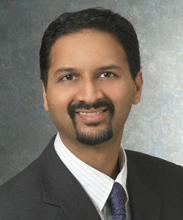Earlier this week, the second annual Artificial Intelligence in Oncology Symposium (AIO 2020) was held by the Case Comprehensive Cancer Center (Case CCC) and the Center for Computational Imaging and Personalized Diagnostics (CCIPD) at Case Western Reserve University.
While there are a number of meetings and workshops discussing Artificial Intelligence (AI) in medicine and AI in cancer, we began planning this event last year with specific intentions of introducing advances in AI in medicine from technical experts with input from key opinion leaders in ethics, policy, regulatory issues, reimbursement and deployment around AI. This year’s four sessions were organized across two days and focused on the role of AI in digital pathology, radiology, drug discovery, and ethics and policy. We were treated to fascinating talks and engaging and exciting panel discussions throughout the symposium. In the digital pathology session, our speakers covered a range of topics spanning the role of AI to predict genomic mutations from pathology images, the role of AI in pharma, challenges and the need for deploying AI in the clinical pathology environment. Geraldine McGinty, MD, MBA, FACR provided an outstanding plenary talk on the role of and the opportunities for AI in radiology. Her key message: radiologists, do not be scared that Artificial Intelligence is going to take away your job, instead, embrace it. The subsequent session on AI in radiology covered challenges and concerns around AI interpretability, the need for large and well-annotated and publicly available imaging datasets, the need to test for AI generalizability and the potential for bias in the training of AI algorithms.
Day two began with three compelling talks on the role of AI in drug discovery. We heard from experts on the opportunities and latest advances in the use of AI for drug discovery, drug repurposing and drug response. The panel discussion covered a range of topics including the role of considering a plurality of populations, the utility of pre-clinical and publicly available datasets in the training of AI approaches, and also the role of pharma in driving innovations in this space. The session was followed by six outstanding talks by students and medical trainees showcasing the use of Artificial Intelligence for lung, brain tumors, the role of AI for predicting outcome and response to chemotherapy and immunotherapy and also the need to carefully consider the role of ethics around AI. The final session focused on ethical and policy considerations in the use of Artificial Intelligence, with three engaging talks covering hype around AI in cancer screening and for precision oncology and targeted therapies, AI for vaccine discovery and the need to consider diverse and underrepresented populations and geographies for building the AI, and finally a discussion around the framework to evaluate the benefits and risks of AI, and paths for payer integration around embracing these emerging technologies.
The main symposium was followed by two parallel “Ask the Expert” virtual meet-ups, one on AI in digital pathology and the other focused on AI in radiology. The break-outs provided an opportunity for trainees, students and junior investigators to ask questions on career paths and employment opportunities in AI and medicine.
While we covered a variety of issues, it is clear that there is still a lot of work to be done in thinking about how Artificial Intelligence can be used for addressing health disparities and social inequality, as well as moving AI from academic labs and into the clinic. In other words, I think this meeting has inspired the next set of questions and sessions for AIO 2021.
It turns out that planning a virtual meeting is just as, and in some ways, more challenging compared to an in-person symposium and none of this could have taken place without the enormous work, energy and dedication of many people both on-screen and behind-the-scenes. From our planning committee and speakers to our staff at CCIPD and the Case CCC, and an incredible campus AV team, many folks made sure this event ran smoothly. Our meeting exceeded expectations, with over 330 registrants, thank you to our participants spanning 5 continents, 16 countries and 26 US states, for making this event a success. Again, we’d like to thank our sponsors and exhibitors: Aiforia, Bristol Myers Squibb, Larvol, Pfizer, Jay and Harita Patel, Boehringer Ingelheim, Genentech, and Tempus for their generous support.
Thank you again to all who joined us for this symposium. As a reminder, the recorded talks will be available via Whova for six months and we greatly appreciate any feedback you have for us via this year’s survey. We are already looking forward to seeing you in-person at AIO 2021 next year!
Anant Madabhushi, PhD
Chair, AIO 2020 Planning Committee
Donnell Institute Professor, Biomedical Engineering
Director, Center for Computational Imaging & Personalized Diagnostics
Case Western Reserve University


